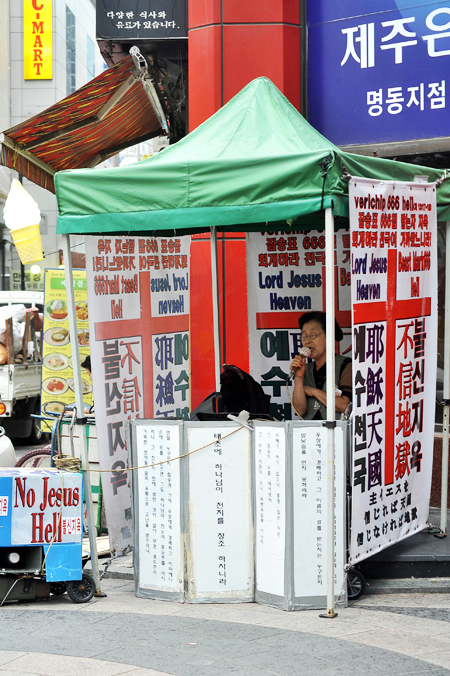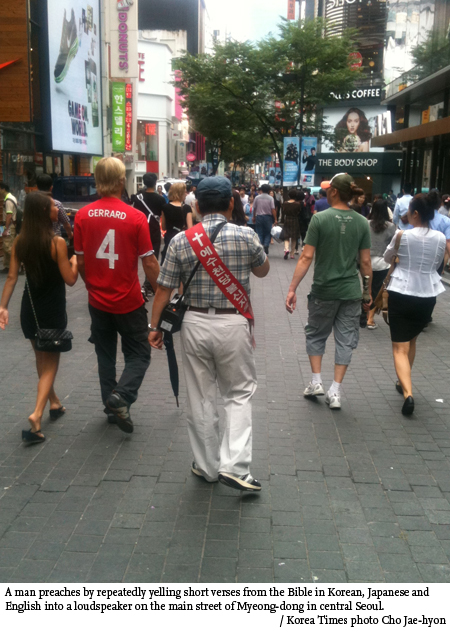
Loudspeaker gospel: good news or street noise?

Some forcefully call for repentance through loudspeakers. They yell: “You will go to hell, if you don’t believe in Jesus!” Others play the guitar and sing hymns. Then there are the quieter street evangelists who hand out leaflets, sometimes with packets of wet tissues.
As well as on the streets, they are also seen on the subway, at stations. They are all committed to a common purpose ― preaching the Gospel in their own way.
Pastor Yoo, in her 50s, heads out every day with a thousand leaflets. She mostly goes to crowded downtown areas such as Myeongdong or Gangnam subway station. Occasionally she gets on subway trains.
“I was called to do this; this is my mission as a believer. I’ve tried doing other work, but I always knew at the bottom of my heart that this is what I should be doing,” said Yoo, who has been preaching on the streets for more than 20 years.
Handing out 1,000 leaflets a day is not an easy task, she said. However, she finds the strength to manage.
“I’ve never thought that what I do is tough. I am happiest when I am doing God’s work,” said Yoo, while she folded the leaflets and stacked them in a neat pile.
But not everyone feels the same way. When she is on the subway, people sometimes report her to the station staff and she has to leave. “So now I just quietly hand out the leaflets,” she said.
Although some methods of preaching may have people frowning at her and denouncing her, for Yoo, all that counts is getting the message across.
“I know that there will be someone who will meet God through my evangelical activities.”
She is the pastor of a small church in Myeongdong which puts heavy emphasis on evangelism. The members of the church are dispatched to various areas across Seoul to carry out their mission.
Noisy disciples
But these passionate and noisy evangelists tend to cause some members of the public to raise their eyebrows.
At around noon on Tuesday, on the main street of Myeongdong shopping district, a man in his late 50s was yelling into a loudspeaker that: “To enter Heaven, you should believe in Jesus, otherwise you will go to hell.”
Walking through the street with a loudspeaker slung on his side, the man yelled in Korean, English and Japanese. Some passersby stared at him and condemned the noise he was making but he dismissed their dagger looks.
Asked whether he has ever thought that his yelling could irk other people, he said, “I feel sorry but I have a mission to do. That’s why I try to evangelize when there are no street vendors,” he said, declining to be named. A follower of a church, he said he comes out almost every day.
Even when it rains, devout believers came out to preach the Word.
“I mostly recite the four Gospels from the Bible ― Matthew, Mark, Luke and John,” said one of them, who was sitting beneath a small tent at the corner of a crossroad in Myeongdong. He had a file filled with handwritten Bible verses. Among the pages were some with verses written in foreign languages.
“Because there are a lot of foreign tourists visiting this area, I have the verses in Japanese, Chinese and German as well.”
Although the police sometimes come and move him along, and others complain of the noise, it doesn’t stop him from preaching, he said.
“Even though there are obstacles, I will continue to come here and tell people about the Gospel,” he said quoting verses from Luke chapter 15. “It says in the Bible how it pleases God when he finds a lost lamb. I believe that there will be people who meet God and start believing in him, through my preaching.”
Not favored by public
However, the general opinion of the public is not very favorable towards street evangelism. Most people say that they find it intimidating. Preaching the gospel to random people on the street could be what evangelists believe is the right thing to do. However, forcing people to believe in a particular religion does not appeal to many.
Usually people start to believe in a religion not through evangelism but by going through a traumatic personal experience such as the death of a family member or a tragic accident.
Choi Doo-young, a 36-year-old IT & business consultant said that preaching itself is not a bad thing but it could be a problem and can even be regarded as offensive by the public.
“I don’t see any logic in what they insist, that if I don’t believe in God, I will go to ‘hell’ after I die, or if I believe in another religion I will be punished. It’s irksome and intimidating,” Choi said.
Forcing something on others is exactly the opposite of personal consideration and choice, elements that most religions seeking converts value. Choi also wonders why those evangelists don’t realize that preaching on the street can repel others, because it can prompt people to form negative opinions of a religion.
“Freedom of religion includes the freedom to not believe in any religion,” said Choi. “Respecting other individuals’ choices regarding religion is also important.”
For others, the act of preaching in the streets is nothing more than a show.
“The impression I get of those people preaching on the street is that they are just showing off how pious they are to anonymous people,” said Yim Chang-bin, a 30-year-old salesperson.
Yim pointed out that the people preaching on the street can be as offensive as those who smoke on the street.
“Both are equally unpleasant since it obviously shows that they do not care how others feel about them,” he said.
It would be far more productive for those people to show how devout they are to others by performing good deeds so they become good examples to society, he said.
Others are less hostile to the idea. A Korean-Canadian marketing manager surnamed Yum said evangelism cannot be labeled black or white.
Yum, an agnostic who was born and raised in a Christian family in Toronto said, “I understand why the evangelists do what they do. I also believe that everyone has the right to practice their religion.”
Living and working in Seoul, there were several instances in which 32-year-old Yum encountered street preachers.
“I mostly just ignored them. A lot of people in Toronto do it, so I was pretty used to seeing them already,” he said.
Just as there are a range of reactions in Canada, depending on the aggressiveness of the preacher, Yum said he feels the same way here.
“I’m fine with them just talking by themselves, but when they start pushing leaflets at me or try to ask me things, I get uncomfortable,” he said.
“It really depends on how aggressive they are. It’s fine as long as I am able to just walk away and say no thank you, and in most cases, I was able to.”
Evangelism: holy mission
Pastor Lee from a church in eastern Seoul said the hatred shown towards people who evangelize in public is actually directed at churches, and that the hate has always been there to hamper proselytizing.
“From a Christians’ perspective, it is a brave and respectable action, especially at a place where some might hate what you do,” Lee said. “I think people need to see the true intention behind their actions and the desperation to convey the message to others even in adversary.”
On the fliers that some evangelists give out on the street, there are hideous pictures depicting hell where sinners are brutally tortured. While some people seem to be fine with the pictures, others said they are terribly reluctant to look at them because they are so horrific.
When asked what the proper way of sharing a faith without putting others off might be, Lee paused for a moment and said what really matters is sincerity and the truth itself, even though it may be bitter and inconvenient.
“I believe one of the biggest problems in terms of faith and evangelism that Christianity faces at this point is that people now tend to only take what they want to hear instead of trying to see the whole truth,” Lee said. “Yes, people can turn their face away from the truth. However, that doesn’t mean that it is not there.”
With that said, frightening pictures might be an effective way to call people’s attention to the truth that they may not want to face, and maybe that could change what they believe and therefore their life as well, Lee said.
“In this generation where people often face temptations everywhere they go, I think, it takes courage to see the truth, even including the people who call themselves Christians. Nonetheless, it is important to remember that Jesus is love. He touched the weak and isolated, the blind and lepers, with true love,” Lee said. “And this is what we have to pursue.”
During the interview, Lee said that people are imperfect; thus, Christians are sinners as well; therefore, maybe those who are trying to evangelize in public could offend others against their will.
“But, if I can touch a single person’s heart by doing so, I will do it. And I believe they feel the same,” Lee said. <The Korea Times/Kim Bo-eun, Bahk Eun-ji, Jung Min-ho>



